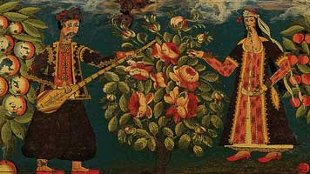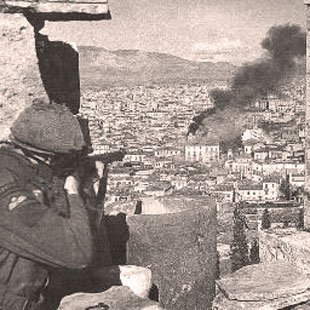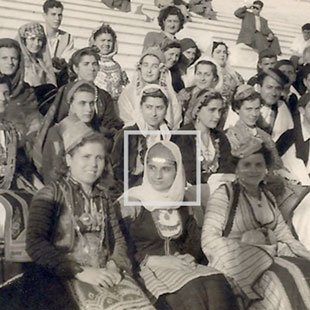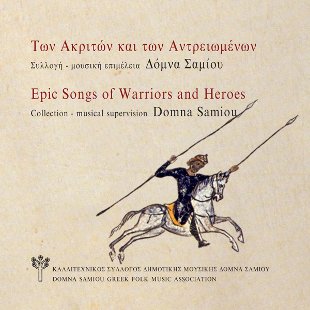You are at: Home page Her Work List of Songs The Castle of the Beauty
Το κάστρο της Ωριάς
Listen
Lyrics
I've never seen a castle as fair as the Castle of the Beauty.
It has silver gates and silver keys,
I've never seen another castle like it.
The Turks besieged it for twelve long years,
for twelve years and thirteen months.
[And a young Janissary, a Greek mother's son,
went to the barber and got a close shave,
he put on women's clothes and acted like a woman.
Taking a pillow for a swollen belly,
and two kerchiefs for breasts,
he dressed up as a woman with child.
Standing outside the gate, he whined and whined:
- Let me in, ill-fated woman that I am,
the babe in my belly ready to be born.
By the time the gates were half-open, a thousand men were through.
By the time they were open wide, the castle was taken.]
Translated by Michael Eleftheriou
Original Lyrics
Το κάστρο της Ωριάς
Σαν της Ωριάς το κάστρο, κάστρο δεν είδα,
σαν της Ωριάς το κάστρο, κάστρο δεν είδα,
τέτοιο κάστρο δεν είδα, γεια χαρά σας βρε παιδιά,
που 'χει ασημένιες πόρτες κι αργυρά κλειδιά,
τέτοιο κάστρο δεν είδα, Φράγκα και καλή καρδιά.
Τούρκοι το πολεμούσαν χρόνους δώδεκα,
χρόνους, μήνες δεκατρείς, συ το νου μου τον κρατείς.
[Κι ένα γιανιτσαράκι, μιας Ρωμιάς παιδί,
εις τον μπαρμπέρη πάει και μπαρμπερίζεται,
γυναίκεια ρούχα βάνει και γυναικίζεται.
Πιάνει ένα μαξιλάρι και βάνει το κοιλιά
και δύο μαντιλάκια και βάνει τα βυζιά
και γίνεται γυναίκα και γκαστρώνεται
κι απ' όξω από τον πύργο πάει και κλαίεται.
- Ανοίξετέ μου να 'μπω το βαριόμοιρο,
που μαι και γκαστρωμένο κι ετοιμόγεννο.
Κι όσο να μισανοίξουν, χίλιοι εμπήκανε
κι όσο να καλανοίξουν, το κάστρο πάρθηκε.]
Information
- Region: Eastern Aegean
- Area: Chios, Mesta
- Categories: Acritic Song, Fable Song (Ballad)
- Rhythm: 4 beats
- Duration: 01:18
Collaborators
- Singer: Marianthi Almyroudi, Evangelia Sarantinoudi
Albums
Notes
The legendary Castle of the Beauty, a castle with a multitude of names which change, like those of the Bridge of Arta, depending on the region to which the tradition or song spread, preserves one of the most readily recognizable traditions in the folk repertoire. There are very few places indeed within the Greek world which do not claim to be near a mythified ruined ‘castle’ which was defended by some mythic princess of great beauty who, when the situation looked hopeless or the castle was taken, threw herself into the nearest ravine to preserve her virtue. It is a tradition, which - like this song - can be read on any number of mythological and symbolic levels.
The song's style - that of a mediaeval legend - led earlier researchers to relate its poetic with a historical fall, and specifically the capture of Amorio in Phrygia by the Arabs in 838, and hence to include it in the Akritic cycle.
Modern research has rejected these arbitrary theories and shone light on the mythological and ethnological elements and motifs of this enigmatic song. In his study on the subject1, K. Gotsis reveals the symbolic nature of the castle and the siege, as well as the renegade who, disguised as a woman, tricks their way into the castle. Equating the castle's fall with the violation of the independent, beautiful maiden, he shows how the whole story refers to eternal issues of identity and the relationship between the sexes, with the apparent historical details serving a purely metaphorical function. Miranda Terzopoulou (2017)
1 Κ.G. Gotsis, Το Κάστρο της Ωριάς, Revue des Études Néo-helléniques 2.1-2/ (1993), pp. 145-162
Recording information
Domna Samiou recorded the song in 1976, in the village Mesta on Chios island.
Member Comments
Post a comment
See also

Song
A Trader Made His Way
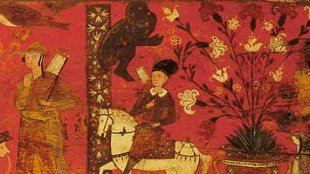
Song
A Trader Made His Way

Song
By Command of the King


Song
Marandon
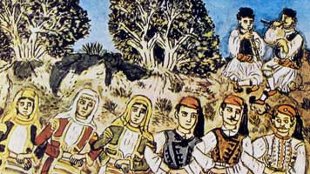
Song
Marandon
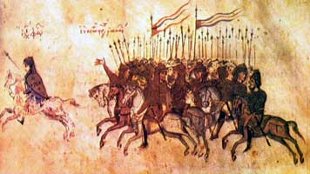
Song
The Four Palikari

Song
With Child A-Mowing

Song
Dawn Glowed in the East

Song
Four and Four

Song
Little Ship, Where Are You Going

Song
So Many Lies

Song
Somewhere in the Aegean Sea

Song
The Lament of the Virgin (Mytilene)
